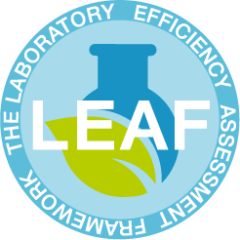LEAF at UNSW
In 2021, five laboratories in the Faculty of Science became the first in Australasia to receive LEAF accreditation. Following the success of a pilot program, a university-wide rollout of LEAF took place in 2022. Laboratory groups joined from across Engineering, Science, Medicine & Health, as well as partners like the Children’s Cancer Institute and the RNA Institute.
In 2025 the UNSW LEAF program has grown to a record 117 registered teams. UNSW lab teams currently hold 53 Bronze Awards, 21 Silver Awards and 10 Gold Awards. LEAF teams have achieved significant savings in greenhouse gas emissions, waste, water, laboratory expenses, and single-use plastics usage.
How does it work?
Once registered, LEAF teams gain access to an online platform where they work through a list of achievable actions that reduce the environmental impact of their lab. Including action on single-use plastic, reducing resource-intensive processes, and improving waste management. To assist in implementing these actions, teams receive support from the Environmental Sustainability team. Providing sustainability resources, lab efficiency products, one-on-one support and funding through the LEAF lab grants initiative.
When teams are ready, they submit an accreditation request. An institute administrator reviews the submission, conducts an in-person lab audit and provides feedback. If the LEAF team meets award requirements, they will receive a certificate denoting their accreditation level. Laboratories progress through bronze, silver and gold award levels at their own pace, generally completing one level per year.
Using in-software emission calculators, LEAF produces comparable and quantifiable data on efficiency and sustainability. This enables baselines, targets and measures to be developed for each unique lab. Equipment and behaviour data is recorded in the calculators by team members before and after participation, allowing users to see the real-world impact of their hard work.
Where to start?
Taking part in LEAF is easy:
- Register an account on the LEAF website.
- Follow the instructions on the LEAF platform guide to set up a team and get started.
Once registered, you will begin receiving information about LEAF and updates on lab sustainability initiatives. If you are unable to register for LEAF at this time, consider subscribing to the LEAF labs emailing list, by emailing LEAFlabs@unsw.edu.au.
Contact Isaac Gunther (Laboratory Sustainability Officer) at i.gunther@unsw.edu.au with any questions.
